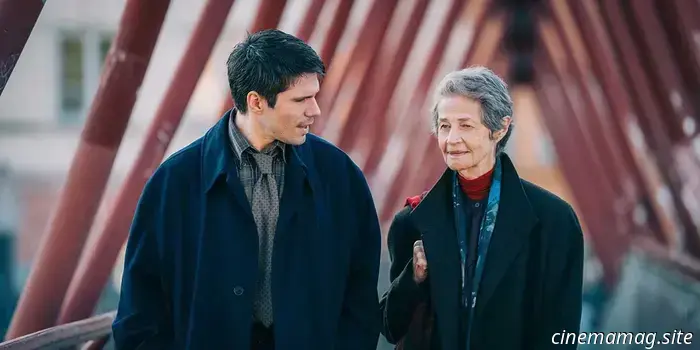
TIFF Review: Two Pianos is Yet Another Profound and Engaging Drama by Arnaud Desplechin
The past makes its presence felt in Two Pianos, the latest film by Arnaud Desplechin, which delves into how beautiful people complicate life's inherent messiness. Set in the classical music scene of Lyon, this story revolves around a tortured pianist's reunion with his equally troubled first love and features the literary and melodramatic elements that are typical of Desplechin. Since he hasn't had a theatrical release in the U.S. since 2017's Ismael's Ghosts, he has somewhat lost popularity there. However, in France, he continues to enjoy a prolific career that attracts some of the country’s finest actors. With Two Pianos, he offers a rich and reflective examination of how we craft our lives around our deepest regrets.
Once a child piano prodigy, Mathias (François Civil) returns to his hometown after being invited by his mentor Eléna (Charlotte Rampling) to perform duets with her at several concerts. After an eight-year absence spent teaching music in Japan, Mathias heads straight from the airport to meet Eléna at an upscale party, where his underdressed appearance—he is given a necktie upon arrival—highlights the awkwardness of his presence. Meanwhile, Claude (Nadia Tereszkiewicz) prepares to go to the same party with her husband Pierre (Jeremy Lewin), arriving late just as Mathias is about to leave. A chance encounter in the elevator leads her to dash away, while Mathias faintly collapses.
This marks just the beginning of Mathias’ troubles: he notices a young child resembling him and asks his mother (Anne Kessler) for an old photo to confirm his memory. It remains unclear whether Mathias' encounters with the boy are real or imagined, but a sudden tragedy connects them back to Claude, forcing the former lovers to confront each other and the emotional baggage they’ve carefully concealed for years.
Revealing every detail of Claude and Mathias' complicated history would spoil the enjoyment of Desplechin and co-writer Kamen Velkovsky’s intricate narrative. However, it’s obvious that their relationship was an affair while Claude was with Pierre—an essential element in any French romantic drama. Instead of dragging out these plot points, Two Pianos swiftly addresses them to concentrate on how Claude and Mathias navigate the burdens of their past actions.
At the aforementioned party, Eléna bluntly rebukes Mathias for isolating himself in Japan when he should have been touring and performing like she has. "I was built for war," she tells him, comparing her lifestyle to that of a monster in that it prevents her from ever truly having a home. Eléna later confides in Mathias that her declining memory means their concerts will be her last, revealing a vulnerability beneath her icy exterior. She realizes that the fortress she constructed throughout her career is on the verge of becoming confining, and she is horrified at the fate she has imposed upon herself. Charlotte Rampling delivers her finest performance in years as Eléna, and when she departs the story (in true Desplechin style, via a letter read directly to the camera), her thin facade of confidence over her fragility creates the film’s most powerful moment.
Depending on how one interprets it, Eléna’s tale can serve as either a parallel or a cautionary tale for Claude and Mathias. Both have spent nearly a decade enveloped in guilt and self-inflicted wounds; although they are young enough to dismantle these arbitrary constraints if they choose, the effort required may seem overwhelming. This isn’t due to anyone else but themselves, as the screenplay cleverly highlights. Much of what they consider sordid secrets are openly acknowledged truths to those around them, who don’t perceive any significant disturbance in what torments them; one of Claude’s friends even tells Mathias that "sorrow is a waste of time."
Desplechin is unconcerned with the notion that it's easy for individuals to shed their sadness. His focus is on human flaws and the myriad ways these imperfections affect and shape their life paths. While he adopts a more formally restrained approach here than in 2022’s Brother and Sister or the Philip Roth adaptation Deception, utilizing straightforward cinematography from DP Paul Guilhaume, there are numerous sudden tonal shifts reflecting the characters' emotional instability. Claude can quickly transition from nearly tearing her clothes off in a building entrance with Mathias to a full-blown outburst of anger and tears in mere cuts.
What stands out is how Desplechin’s directorial style, along with the performances of Civil and Tereszkiewicz, manages to portray these moments without feeling abrupt. They unfold like waves of emotion, relatable in how quickly feelings can change, and understandable given the turmoil Claude and Mathias experience as they suppress their desires. Two Pianos offers a glimpse into a brief, chaotic period in their lives, where they briefly assess what could have been and are nearly consumed
Other articles
 McFarlane Toys reveals new action figures based on Demon Slayer: Kimetsu no Yaiba.
McFarlane Toys has officially introduced its action figures of Sanemi Shinazugawa, Nezuko Kamado, and Zenitsu Agatsuma from the popular anime series Demon Slayer: Kimetsu no Yaiba, which are currently available for pre-order. Take a look at the promotional images and information below… SEE ALSO: Video Review – Demon Slayer: Kimetsu no Yaiba – The Movie: Infinity Castle The Wind […]
McFarlane Toys reveals new action figures based on Demon Slayer: Kimetsu no Yaiba.
McFarlane Toys has officially introduced its action figures of Sanemi Shinazugawa, Nezuko Kamado, and Zenitsu Agatsuma from the popular anime series Demon Slayer: Kimetsu no Yaiba, which are currently available for pre-order. Take a look at the promotional images and information below… SEE ALSO: Video Review – Demon Slayer: Kimetsu no Yaiba – The Movie: Infinity Castle The Wind […]
 Over 190 graduates from Full Sail University are credited on more than 170 nominated projects at the Emmys - MovieMaker.
Graduates of Full Sail University have once again left their imprint on television this year, with over 190 alumni recognized across more than 170 nominated projects.
Over 190 graduates from Full Sail University are credited on more than 170 nominated projects at the Emmys - MovieMaker.
Graduates of Full Sail University have once again left their imprint on television this year, with over 190 alumni recognized across more than 170 nominated projects.
-Movie-Review.jpg) Modern Whore (2025) - Film Review
Modern Whore, 2025 Directed by Nicole Bazuin. Featuring Andrea Werhun. SYNOPSIS: Chronicles Andrea Werhun as she embodies her earlier personas as escort Mary Ann, stripper Sophia, and her activities on OnlyFans – all encapsulating her journey through sex work in Toronto. Writer/director Nicole Bazuin marks her first feature film with Modern Whore, a hybrid documentary that explores the experiences of […]
Modern Whore (2025) - Film Review
Modern Whore, 2025 Directed by Nicole Bazuin. Featuring Andrea Werhun. SYNOPSIS: Chronicles Andrea Werhun as she embodies her earlier personas as escort Mary Ann, stripper Sophia, and her activities on OnlyFans – all encapsulating her journey through sex work in Toronto. Writer/director Nicole Bazuin marks her first feature film with Modern Whore, a hybrid documentary that explores the experiences of […]
TIFF Review: Two Pianos is Yet Another Profound and Engaging Drama by Arnaud Desplechin
The past makes its presence felt in Two Pianos, the latest film by Arnaud Desplechin, which delves into how beautiful individuals complicate the already chaotic nature of life. Set in the realm of classical music in Lyon, this story revolves around a distressed pianist's reunion with his equally troubled first love, featuring literary and
